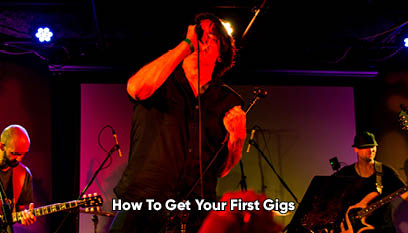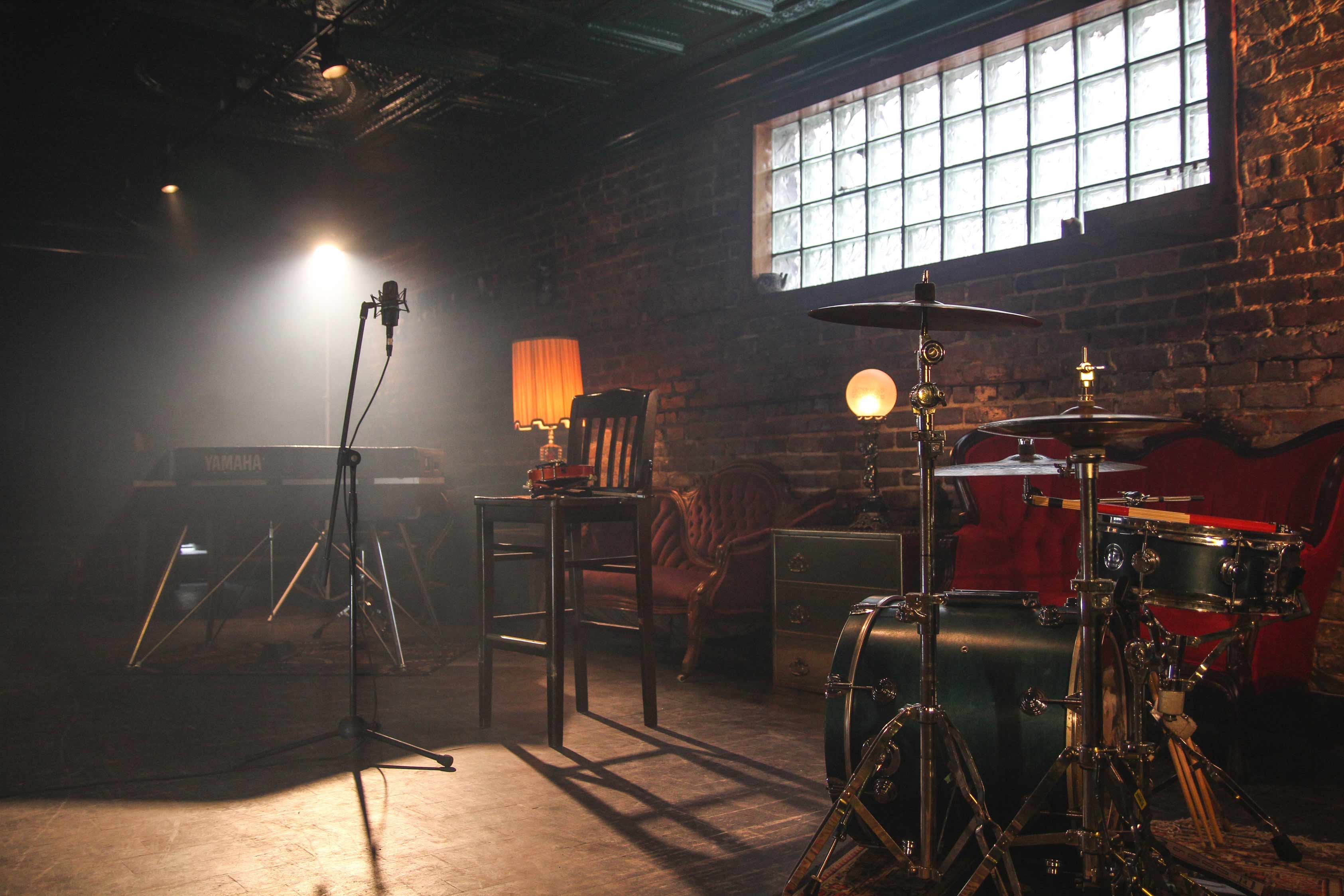 Now that you’ve spent some time dialing in your tone, it’s time to take it out of the garage and on to the stage. Many first timers find the whole process of getting gigs intimidating, but it doesn’t have to be.
Now that you’ve spent some time dialing in your tone, it’s time to take it out of the garage and on to the stage. Many first timers find the whole process of getting gigs intimidating, but it doesn’t have to be.
Make a Demo
The first thing you need is a demo that is representative of the kind of gig that you are looking to be hired for. If you don’t have a demo, you might as well not bother. Any talent buyer or venue manager is going to want as much information as possible before they give you their microphone.
 This demo does not have to be the world’s most perfectly recorded masterpiece. As long as you preface your recording with a statement that sets realistic expectations, you should get a fair shake.
This demo does not have to be the world’s most perfectly recorded masterpiece. As long as you preface your recording with a statement that sets realistic expectations, you should get a fair shake.
For example, you could say, “Here’s our first demo. It’s something we recorded live in our rehearsal space. While it’s not sonically the best representation of our artistic vision, it is an accurate representation of the vibe we bring to a live performance.” The talent buyer will know that the recording will be rough around the edges, and won’t dock any points for a bad mix.
But if that’s your situation and you lead with, “You’ve got to hear our demo. It’s the greatest thing you’ll hear today!” you’re going to disappoint them. They will conclude you don’t know what a good mix sounds like.
If you don’t have the money to record a proper demo but you do have a practice space, your best bet is to record a cellphone video. Find the spot in the room where you can set up a cellphone that will 1) capture the best audio of the performance, and 2) show the band in action so the viewer will get an idea of your stage presence.
However long you take finding the sweet spot visually, you should spend twice as much time getting the sound right. The talent buyer will do more listening than watching.
If you have some basic video and audio editing skills, you can also take advantage of programs like iMovie and Gagageband on a Mac. With very little effort you can separate the audio from the video in iMovie and then use Garageband to apply some equalization. Then you can export it as an audio file. Now you have both a video and audio demo you can use to try and land some gigs.
Get a Promo Photo
 A good band photo will help communicate what the band is all about and show that you take what you’re doing seriously. It will also be useful for promoting the gig once you get it.
A good band photo will help communicate what the band is all about and show that you take what you’re doing seriously. It will also be useful for promoting the gig once you get it.
While hiring a professional photographer is likely going to yield the best results you can explore other options including DIY options. For more information on what this would take check out my DIY Media Recommendations.
Write Your Elevator Pitch — and Memorize It
Any reputable career center will encourage you to prepare a good elevator pitch about yourself. The idea is that if you run into a major decision-maker in the elevator, you have only a few seconds to impress them. You need to be able to quickly and clearly explain what you do and why they should hire you or invest in your business idea.
The concept of an elevator pitch isn’t just for people trying out for Shark Tank. It’s really important for musicians too, and really any kind of professional.
One of my favorite memes is Inigo Montoya’s Guide to Networking Success:
Hello. My name is Inigo Montoya. You killed my father. Prepare to die.
- Polite Greeting
- Name
- Relevant Personal Link
- Manage Expectations
At its core, an elevator pitch should be as simple–just without the prepare to die part.
- Greeting
- Who you are
- Why they should care
- Your goal
For example, here’s a pitch I’d use for a band that I used to play in about 5 years ago, if we were looking to line up gigs today:
Hello. My name is Nate and I am the lead guitarist for the band Cal Powers and the Alrights. We’re a four-piece rock band in the vein of Social Distortion and Cal’s early 90s band, Wooden Igloo. We’re looking to get started playing gigs again after taking a few years off. There’s a lot of excitement seeing Cal back out on the stage again, especially after the write-up in the March edition of Portsmouth Magazine. I’d love to get the band added to any suitable bills you’re in the process of putting together, or I’d be happy to put together a night based around our band if you have an available date.
Are you bristling at this mercenary approach? Many players view what they do as art, and therefore have a hard time commercializing it. If that’s you, think about why you are looking to get gigs. If you just want some people to hear you play, that’s fine, but your approach will have to be different if you want to actually make money from your music or attain any level of fame or prestige.
To develop your elevator pitch, think about your music. Why would someone want to spend their hard-earned money to see you play? Do you have a sound similar to their favorite band? Does someone in the band possess master-level skill that people stare at with awe? Does your group create a vibe that just gets people moving? Whatever it is that makes you interesting, that’s your value-add. That’s what you should highlight in your elevator pitch.
Remember that booking agents will need some sort of description so they can sell you to the agents and managers for the bands you want to open for. Make their job easier by coming up with a compelling (but accurate!) elevator pitch. Practice it until you can confidently recite it off the top of your head.
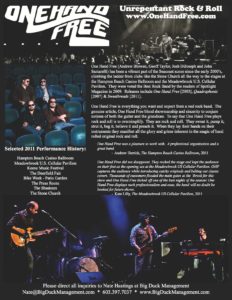
Develop a One-Sheet
An elevator pitch is, at most, a paragraph. You should also have a one-sheet. A one-sheet is called that because it covers an entire sheet of paper. That doesn’t mean it should be a boring wall of text, though! It’s best to include a mix of photos, art, and useful information.
Having a one-sheet is like having a resume. It lets your potential employer (because that’s what a talent buyer or promoter is) know that you’re serious enough about what you’re doing to come up with a professional presentation. If spelling isn’t your thing, find an English major friend to proofread it for you.
Here’s an example one sheet for a band that I managed a while back. For the most part, I would recommend a format similar to what I used, but I would probably find ways to make the text of the quotes look more visually different than the text that I used to describe the band.
The photos that I used were a posed promo photo and two live shots. The live shots were both taken at some of the biggest gigs that the band has ever played. The quotes are also from staff at two of the largest venues in the state. I chose to focus on these images and use these quotes to give off the impression that this band has been trusted to do well by important people and they delivered on that promise.
Of course a band that is just starting out will not have a gig history to draw on. So I would recommend that the one-sheet be almost entirely based on visuals. If you have made connections with noted musicians in your scene, ask if they would be willing to provide a quote for you. Some words of support from a respected figure in your scene will be very helpful when you’re starting out.
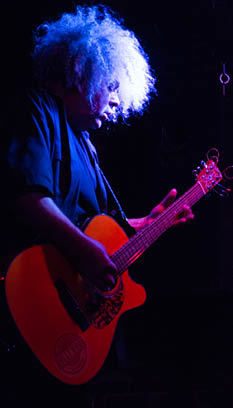
Web Presence
Thanks to sites like Bandcamp, it’s very easy for musicians to put a demo, bio, and photo in one location. No one likes to have their email account or DMs blown up by large attachments, so take advantage of these platforms and save everyone’s WiFi bandwidth.
Talent buyers can tell if you’re cutting corners, just like other consumers can. When my wife and I were house-hunting, we hated coming across real estate listings with only a handful of photos. Nothing says “amateur hour” like providing the bare minimum of photos — especially if some of those photos are blurry or pointless (nobody needs a close-up of the curtains!).
So take the time to make your band’s online profile as complete as possible. Don’t just put one photo up if the platform will allow you to post five. This is a simple way to show you’re taking this part of the process seriously.
In addition to Bandcamp, sites like Bandzoogle make it really easy for a band to create an official website. Weebly and Wix are other options for building websites easily, but Bandzoogle’s templates are geared specifically towards bands.
Be Ready To Perform More Than Just Your Tunes
Many, many years ago I went to visit friends in Rhode Island who were in a band that was doing regular club sets in New York City, Providence, and Boston. I took photos of their rehearsals so they would have images for their promo materials. After they played a few tunes, they did something I never expected: they started a stopwatch, and then quickly moved all their gear to the opposite side of their rehearsal space.
They understood that club gigs tend to be highly timed-out exercises. The schedule may look something like this:
- Band one from 9:00 PM to 9:30 PM
- Band two from 9:40 PM to 10:10 PM
- Band three from 10:20 PM to 10:50 PM
- Band four from 11:00 PM to 11:30 PM
If a band doesn’t hit the stage on time, the delay doesn’t push the whole night back — it just eats into that band’s set. So it’s critically important that a band setup on time to protect their own set time. It’s also important that they strike their gear quickly to protect the other bands’ set times.

Get On The Same Page
If you’re part of a project with multiple musicians, have an agreed-upon plan and list of priorities. If your band is trying to make it big, EVERYONE needs to be on the same page about that. Even if you eventually succeed, you may struggle for years before you break. If the rhythm guitarist’s main passion is gardening, or if the bass player has already enlisted in the Marines like in That Thing You Do, you know they won’t be in it for the long haul. You should address it now before things get weird.
The same goes for any topic that may be a point of conflict in the band. The more you can have honest and open conversations, the better. At the height of Beatlemania when it was them against the world, the Beatles were a cohesive unit. It was only after they achieved fame beyond their wildest dreams, lost their administrative center in Brian Epstein, and drifted physically apart that the cracks began to appear.
Once you and the band know what you’re after, agree on a plan of attack. Whether you have an external person booking your shows or you’re doing it yourself, the person in contact with talent buyers needs a certain level of executive authority to commit the band to an engagement.
Personally I’ve found that the best way to do this is to agree to a central calendar where everyone can see dates that have been blocked out, penciled in, and confirmed. This works well with an agreed-upon window for booking (say, at least a month in advance).
Like I said earlier, some folks have a hard time treating their art like a business. If that’s you, I strongly suggest that you have someone you know and trust handle the negotiations.
When I ran my own management company, I used to tack business cards up in the local music shops just to see if I’d get any bites. One time my phone rang and a musician’s girlfriend was on the other line. I asked what I could do for them and she said, “I’m calling about the management.” She had no idea what the band needed, and no authority to commit the band to anything. It was a strange phone call.
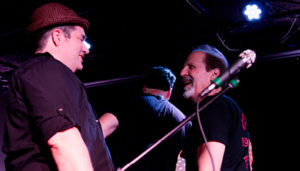
Know Your Scene
It’s important to know your scene, which brings up one of those terrible buzzwords: networking.
Don’t panic. Don’t close this window. It’s not that bad. Thankfully in the music world, “networking” often means having a pint while you check out another band.
See what I mean? Not that bad.
Introduce yourself. Chat with the bands. Let them know you have a band. If you think your bands would do well together, say so.
Don’t forget the final step: Drop them a line the next day or so. Write a quick email to say that it was nice to meet them and remind them that you chatted. Instead of “that person I met at the gig,” you’ll become a real live connection with a name and a story.
Booking agents are far more likely to consider booking your band if they see you attending shows yourself and supporting the local scene. If they only hear from you when you’re begging for gigs, it doesn’t leave a great impression.
Establish Realistic Venue Goals
In every scene, there are places that only the top-tier bands get to play and there are places any band can play — with a variety of venues in between. It’s important to be honest with yourself about what kind of band you have any what kind of venue is appropriate.
You need to acknowledge that your goal is different from the venue’s goal. Your goal is to be heard. The venue’s goal is to make money. Yes, it’s important for them to put on quality events, but they can’t do that if they can’t keep the lights on. If you’ve wondered why so many reputable clubs and theaters put on tribute nights or other safe events like that, it’s because a payday with one of those gigs allows them to take a chance on something else. That’s why cover bands will always have a place — they’re less of a risk for a venue, and venues are by nature risk-averse.
So make a list of the venues you’d like to play. Once you’ve made your list, it’s time do so some homework.
Any venue in your league will have some kind of contact information posted online. When I was last managing bands, the top club in the area had a strict policy for contacting them. You had to call during a set time window on a set day if you wanted to book your band. At first that may seem a giant pain, but if you look at it from the talent buyer’s perspective, that gives their workweek focus and cuts down on scope creep throughout the week.
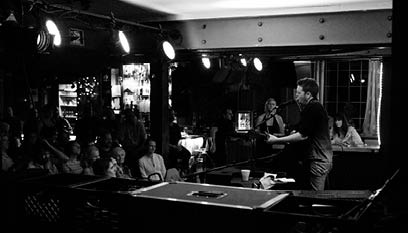
That set-up isn’t really the norm, though. Most venues conduct booking through email. Since everything is in writing, you know exactly when you tried to contact them last. That makes it easy to know when it’s time to send a follow-up email.
It’s important to be professional and diligent, but you also don’t want to be annoying and write day after day. Don’t track down the booking agent’s personal profile and try to contact them via Facebook messenger — most people will find that creepy.
You also need to find out what kind of sets the venues offer. Are you a city club band where an average set is about 30 minutes and a “long set” is 45 minutes? Then there’s no sense in you reaching out to a rural tavern where the bands go “all night long, all night strong.”
If your band is just starting out, you probably can’t do an all-night set even if you wanted to! So the way in is to reach out to other bands playing there and ask if you can open for them. Usually the band can give you a straight-up yes or no, but in some cases they will have to check with the venue.
Own Your Mistakes
I can vividly remember screwing up as a manager twice. The first time, I was trying to get the band I represented into that club where you have to call at a particular time. I was so excited that it was going so well on the phone, I missed that the bass player had blocked out the whole day on the calendar (because of the way it displays on the screen). D’oh!
I immediately called the venue back, owned my mistake, and said that I was happy to call back the next week during the booking window. Thankfully, the response was “Well, when CAN you play?” and we were able to nail down another date on the spot.
The other notable screw-up was a cut-and-paste fail. The band had an annual gig during Laconia, New Hampshire’s famed Motorcycle Rally. I was trying to get them a second gig during the rally and reached out to any venue I could find via email. In the haste, I expressed my strong desire to book my band into the Broken Spoke Saloon to the talent buyer of a competing club. They were not impressed and told me so. I had no choice but to apologize and move on.
Negotiating Payment
When you’re just starting out, you’re likely just playing for exposure. However, as soon as your band starts to build a following, it’s time to start making sure you get paid. I’ll focus on payment and negotiation in a future post. For now we’re just trying to get you your first few gigs.
Paperwork
Riders, stage plots, and input lists are some simple documents that you should have prepared before you land any gigs. That way you’re not scrambling to come up with them if the venue asks.
A rider is a list of technical or hospitality requirements that a band requests for a gig. If you’re just getting started, it’s very unlikely that you’ve ever been asked for a rider.
There’s a very good chance that you’ll be asked for an input list, which is a list of all of the input channels and microphones you need to properly put on your live show.
A stage plot is a graphical representation of the way your band sets up on stage. It can’t hurt to have one of these prepared in advance, but if you’re opening you’ll probably be expected to accommodate the stage plots of the more established bands (especially if gear-sharing or backline is part of the arrangement).
In Closing
If you bite it off into chunks, going after gigs doesn’t have to be that intimidating.
Make sure you’re ready. You’ll likely hear “no” a few times. Hearing nothing at all is a lot more common, unfortunately. Be persistent. Don’t take anything personally.
As long you follow these steps, you’ll be golden.

